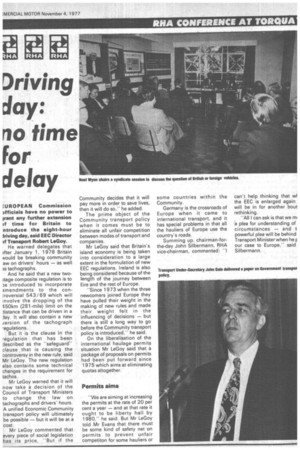Driving day: no time For delay
Page 67

If you've noticed an error in this article please click here to report it so we can fix it.
EUROPEAN Commission 3fficials have no power to prant any further extension if time for Britain to ntroduce the eight-hour iriving day, said EEC Director A Transport Robert LeGoy.
He warned delegates that 3fter January 1, 1978 Britain rvou I d be breaking community aw on drivers hours — as well 3 s tachographs.
And he said that a new two;tage composite regulation is to ae introduced to incorporate amendments to the con:roversial 543/69 which will nvolve the dropping of the 150km (281-mile) limit on the listance that can be driven in a Jay. It will also contain a new version of the tachograph -egulations.
But it is the clause in the 'egulation that has been Jescribed as the "'safeguard' clause that is causing the controversy in the new rule, said Mr LeGoy. The new regulation also contains some technical changes in the requirement for tachos.
Mr LeGoy warned that it will now take a decision of the Council of Transport Ministers to change the law on tachographs and drivers' hours. A unified Economic Community transport policy will ultimately be possible — but it will be at a cost.
Mr LeGoy commented that every piece of social legislation has its price, "But if the Community decides that it will pay more in order to save lives, then it will do so," he added.
The prime object of the Community transport policy when it comes must be to eliminate all unfair competition between modes of transport and companies.
Mr LeGoy said that Britain's island economy is being taken into consideration to a large extent in the formulation of new EEC regulations. Ireland is also being considered because of the length of the journey between Eire and the rest of Europe.
"Since 1973 when the three newcomers joined Europe they have pulled their weight in the making of new rules and made their weight felt in the influencing of decisions — but there is still a long way to go before the Community transport policy is introduced," he said.
On the liberalisation of the international haulage permits situation Mr LeGoy said that a package of proposals on permits had been put forward since 1975 which aims at eliminating quotas altogether.
Permits aims
"We are aiming at increasing the permits at the rate of 20 per cent a year — and at that rate it ought to be liberty hall by 1980," he said. But Mr LeGoy told Mr Evans that there must be some kind of safety net on permits to prevent unfair competiton for some hauliers or some countries within the Community.
Germany is the crossroads of Europe when it came to international transport, and it has special problems in that all the hauliers of Europe use the country's roads.
Summing up, chairman-forthe-day John Silbermann, RHA vice-chairman, commented: "I
can't help thinking that wl the EEC is enlarged again will be in for another bout rethinking.
''All I can ask is that we rm a plea for understanding of circumstances — and t powerful plea will be behind Transport Minister when he F our case to Europe," said Silbermann.
















































































































